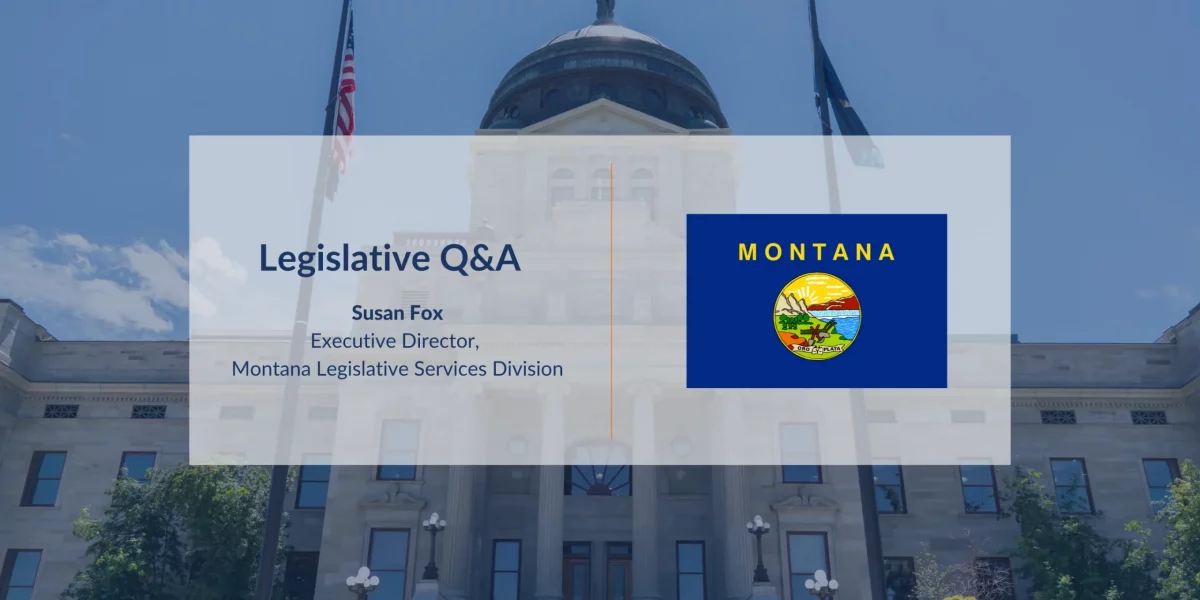At the heart of every legislature is the staff ensuring its smooth running. In this Legislative Q&A series, we’re talking to legislative experts and staff about their journey to the legislature, shining a light on the working lives at the heart of American law-making. In the second of a two-part discussion, we spoke to Susan Fox, retired Executive Director at the Montana Legislative Services division. Susan talks about finding the balance between the advantages of technology while preserving the deliberative nature of the legislature. She also tells us why she’s excited about the ability to bring the legislature to more people through technology and her thoughts on approaching change.
1. What’s on your radar for 2023? What do you kind of think are the biggest talking points?
Well, being retired, I think those challenges of legislative independence, and how we make sure that we are in charge of what we need to keep the legislature operational, robust, and moving forward.
Cybersecurity is also probably right up there. The law is slow compared to technology and I don’t think we can ever be at the cutting edge of technology all the time. But how do you keep up and bring along an institution that is, by definition, deliberative and slow? There are people who want us to go paperless completely. But there are also legislators that still want paper. How do we bring them along technologically and not leave anybody behind? Maybe it’s because I’m older, but I worry about that more than the technology. I think that will take care of itself. Younger legislators, younger staff take to it like water, they’ll move right along. But how do you not leave anybody behind both in the public sector and the public in general?
2. And I suppose, from a process point of view as well, safeguarding what's there.
Sometimes efficiency is not what the legislature is about. Again, it is a deliberative process, and we need to maintain those steps and, and that time to do that. We come under pressure from leadership and legislators to speed things up and of course, technology helps us do that. But do we lose something in the process?
With technology, they think you just press a button and everything’s fine, but there are still a lot of human steps. How do you find that balance between the benefits of technology while not losing the deliberative process so that there’s still some time to think between votes, between bill drafts, between second reading and third reading? If we have the time to develop the bill, it ensures that it is in good condition for that last vote, or for the next committee meeting so that not only the legislators but also the public knows what the legislature is doing.
The internet and publishing things online help a lot with that transparency. But if you speed through the process too quickly, you lose that time for people to digest what’s going on. How do you keep some of that traditional rhythm of allowing a bill some time and time for people to process while technology is allowing you to zoom it through?
3. Montana is synonymous with the Rockies, Yellowstone. What's one thing that you love about your state?
We’re only at about a million population but we’re the fourth largest state, so getting from one side to the other takes a lot of time. Yes, a lot of people think of Glacier and Yellowstone and the mountains but there are another almost two-thirds of Montana that is foothills, rolling hills, and plains and high prairie, a lot of agriculture. A lot of very rural areas.
A couple of areas are growing like crazy right now and then there are rural areas that are struggling for population. We’re still struggling to make sure there’s broadband at the far reaches of our space, too. With remote testimony and the ability to help those people who live far away from Helena, or during winters, when it’s not advisable to travel, I think we’ve been able to give the public more access to the legislature than before.
With technology and the ability to post bills online, I’m really excited about that ability to bring the legislature to more people. I also hope it helps people get more involved in our government and our state legislature. Politics in America right now – and Montana is no different – is very, very partisan, and divisive.
That’s what gets the headlines, right, but there’s a lot of just ‘meat and potatoes’ legislation that’s helping local governments, nonprofit organizations, helping people in Montana that need help, that I think a lot of us can get behind. I’m hopeful that we can get through this era of partisanship and use technology to help Montanans get more active and involved in their government so that the representatives are representing their needs and their interests.
But I just love the diversity of Montana. You could work with somebody from one of our bigger towns or cities and universities, and then you’ve got a farmer and a rancher. Montana has a citizen legislature so most of them – if they’re not retired – have other jobs. They have expertise in their own area, whether they’re a teacher or a businessman, a lawyer or a farmer or a rancher. So, you get a nice diversity of people.
4. If you could travel back in time and speak with your younger self, what advice would you give?
That’s a really good question! I think just staying open to change and maybe paying more attention. You get so involved in everything – writing as fast as you can, doing your job, and moving forward. Maybe take a little bit more time to pay attention and focus on what is actually happening. And then think about where you can help look forward to ask: is this positioning this well for the future? Or are we just trying to get through the day?
Also, take time to enjoy that time, the things that you’re learning.
5. What advice would you have for younger staff just starting their legislative careers?
I am not opposed to change. My younger staff, the next era coming up, they want to change a lot. Quickly. And like I said, I don’t mind that. But I would hope that people would look and see why we did things the way we did them. Was it a technological limitation? Was it an expertise limitation? Or was there a process reason?
Sometimes my greatest fear with digitizing everything in the world and getting rid of every piece of paper is what are archaeologists going to do in 100 years if the digital world is not available? We all have floppy disks left over from the 90s.
Unless you’ve got a really good archive – a robust way of keeping track and making sure that all the documents that we were producing can be accessed – how do you retain that knowledge in a format that will be accessible in the future?
Don’t just go changing for the sake of change. Know what you’re changing and why, and what you need to bring forward from the past – what is important and integral to the integrity of your institution.
6. Thank you for speaking with us today, Susan. Do you have anything else you want to add or any final comments?
I’ve spent the last eight years working with Propylon. Technology has evolved so much even since we all started working together. But it’s been a real pleasure to have access to people who do what you do and who have a care and love for the legislative institution. There are not a lot of people who care enough to develop that expertise, other than those inside it. So, it’s been a pleasure to work with a group of people that also value that legislative process and understand that it’s a crazy, mixed-up process.
We – legislatures – all do the same thing, right? We all pass laws. But nobody does it the same way. There are many different ways you can do an institutional process, but Propylon has always respected that difference. I really liked the give and take – that we’re moving forward at the same time, we’re evolving, but preserving the traditional things, finding new ways, and giving us new ideas.

